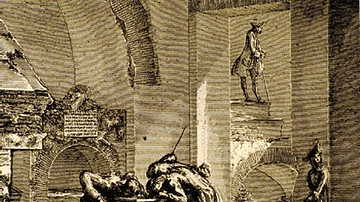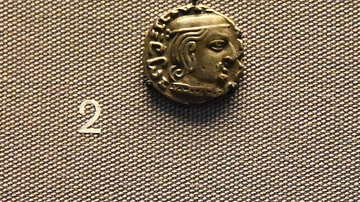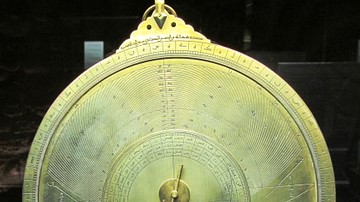Search
Search Results

Image
Columbarium Being Stripped Bare by 18th-Century Treasure Hunters
From the 15th-18th centuries CE, the many columbaria that lined the consular highways leading out of Rome were plundered and destroyed. Consequently, one sees bits and pieces of them cemented into the walls of villas and palazzos all over...

Image
The Korean Peninsula and the Japanese Archipelago, 3rd-6th century CE
Map of Pen/Insular states and potential centres in the 3rd–6th centuries CE.

Image
3rd Century CE Indian Coin with Date
In the ancient world, some coins had dates on them. giving us precise information as to when people ruled. These coins are inscribed with dates, so they give fixed points in the chronology of ancient states, to which other evidence can be...

Image
Athenian Silver Coin, 6th Century BCE
Athenian coin, silver, 550-546 BCE. Minted in the ancient Greek city-state of Athens, this silver coin depicts a Gorgon's head, a symbolic ward against evil also known as a "gorgoneion." On the reverse, not pictured here, is stamped a square...

Image
10th-century Equatorium
Equatorium of Jafar al-Khazin (900-971 CE).
Istanbul Museum of the History of Science and Technology in Islam.

Video
The Crisis of the Third Century Explained
The Crisis of the Third Century (also known as the Imperial Crisis, 235-284 CE) was the period in the history of the Roman Empire during which it splintered into three separate political entities: the Gallic Empire, the Roman Empire, and...

Video
Sultan Suleiman Marries Hurrem | Magnificent Century
Sultan Suleiman Marries Hurrem | Magnificent Century Click to watch full episode: https://www.youtube.com/watch?v=cooAiT3JY8k The golden years of the Ottoman Empire come to life in a television series. The life of Suleiman the Magnificent...

Video
The Roman Empire: Crisis of the 3rd Century - Full Documentary
The Crisis of the Third Century, also known as Military Anarchy or the Imperial Crisis (AD 235–284), was a period in which the Roman Empire nearly collapsed under the combined pressures of invasion, civil war, plague, and economic depression...

Definition
Ghana Empire
The Ghana Empire flourished in West Africa from at least the 6th to 13th century. Not connected geographically to the modern state of Ghana, the Ghana Empire was located in the western Sudan savannah region (modern southern Mauritania and...

Video
18th Century CE Warfare: Crash Course
European powers had a lot of wars in the 18th Century CE, and they weren't confined to Europe. Conflict raged across the globe, in what might be called a World War...but we don't call it that, because we already have a couple of those coming...